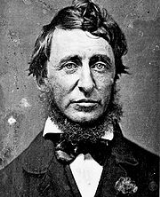Henry David Thoreau was an American author, poet, philosopher, abolitionist,
naturalistNatural history is the scientific research of plants or animals, leaning more towards observational rather than experimental methods of study, and encompasses more research published in magazines than in academic journals. Grouped among the natural sciences, natural history is the systematic study...
,
tax resisterTax resistance is the refusal to pay tax because of opposition to the government that is imposing the tax or to government policy.Tax resistance is a form of civil disobedience and direct action...
,
development criticDevelopment criticism refers to criticisms of technological development.-Notable development critics:*Edward Abbey*John Africa*Stafford Beer *Charles A...
,
surveyorSee Also: Public Land Survey SystemSurveying or land surveying is the technique, profession, and science of accurately determining the terrestrial or three-dimensional position of points and the distances and angles between them...
, historian, and leading
transcendentalistTranscendentalism is a philosophical movement that developed in the 1830s and 1840s in the New England region of the United States as a protest against the general state of culture and society, and in particular, the state of intellectualism at Harvard University and the doctrine of the Unitarian...
. He is best known for his book
WaldenWalden is an American book written by noted Transcendentalist Henry David Thoreau...
, a reflection upon
simple livingSimple living encompasses a number of different voluntary practices to simplify one's lifestyle. These may include reducing one's possessions or increasing self-sufficiency, for example. Simple living may be characterized by individuals being satisfied with what they need rather than want...
in natural surroundings, and his essay
Civil DisobedienceCivil Disobedience is an essay by American transcendentalist Henry David Thoreau that was first published in 1849...
, an argument for individual
resistance to civil governmentCivil disobedience is the active, professed refusal to obey certain laws, demands, and commands of a government, or of an occupying international power. Civil disobedience is commonly, though not always, defined as being nonviolent resistance. It is one form of civil resistance...
in moral opposition to an unjust state.
Thoreau's books, articles, essays, journals, and poetry total over 20 volumes. Among his lasting contributions were his
writings on natural historyNature writing is generally defined as nonfiction prose writing about the natural environment. Nature writing often draws heavily on scientific information and facts about the natural world; at the same time, it is frequently written in the first person and incorporates personal observations of and...
and philosophy, where he anticipated the methods and findings of ecology and
environmental historyEnvironmental history, a branch of historiography, is the study of human interaction with the natural world over time. In contrast to other historical disciplines, it emphasizes the active role nature plays in influencing human affairs. Environmental historians study how humans both shape their...
, two sources of modern day
environmentalismEnvironmentalism is a broad philosophy, ideology and social movement regarding concerns for environmental conservation and improvement of the health of the environment, particularly as the measure for this health seeks to incorporate the concerns of non-human elements...
.

![]()
![]()
![]()
![]()

